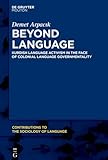Beyond Language : Kurdish Language Activism in the Face of Colonial Language Governmentality / Demet Arpacık.
Material type: TextSeries: Contributions to the Sociology of Language [CSL] ; 125Publisher: Berlin ; Boston : De Gruyter Mouton, [2024]Copyright date: 2025Description: 1 online resource (X, 342 p.)Content type:
TextSeries: Contributions to the Sociology of Language [CSL] ; 125Publisher: Berlin ; Boston : De Gruyter Mouton, [2024]Copyright date: 2025Description: 1 online resource (X, 342 p.)Content type: - 9783111139739
- 9783111144399
- 9783111143873
- 491.597 23/eng/20241111
- PK6901 .A77 2024
- online - DeGruyter
- Issued also in print.
| Item type | Current library | Call number | URL | Status | Notes | Barcode | |
|---|---|---|---|---|---|---|---|
 eBook
eBook
|
Biblioteca "Angelicum" Pont. Univ. S.Tommaso d'Aquino Nuvola online | online - DeGruyter (Browse shelf(Opens below)) | Online access | Not for loan (Accesso limitato) | Accesso per gli utenti autorizzati / Access for authorized users | (dgr)9783111143873 |
Browsing Biblioteca "Angelicum" Pont. Univ. S.Tommaso d'Aquino shelves, Shelving location: Nuvola online Close shelf browser (Hides shelf browser)

|

|

|

|

|

|

|
||
| online - DeGruyter Grammatical Categories in Linguistics and Education / | online - DeGruyter How Science Engages with Ethics and Why It Should : An Interdisciplinary Approach / | online - DeGruyter Ausverkauft : Arbeitswelten von Verkäuferinnen in der Bundesrepublik Deutschland / | online - DeGruyter Beyond Language : Kurdish Language Activism in the Face of Colonial Language Governmentality / | online - DeGruyter Haywood: Certain Island. 1, Memoirs of a Certain Island Adjacent to the Kingdom of Utopia / | online - DeGruyter Nietzsches Naturen / | online - DeGruyter Die Kathedrale im globalen Christentum : Konfessionsgeschichte, Kultur und Architektur / |
Frontmatter -- Acknowledgements -- Contents -- List of figures -- Abbreviations -- Introduction -- Chapter 1 Kurds and Kurdistan -- Chapter 2 Colonial language governmentality in Turkey and its relation to Euro-Colonial linguistics -- Chapter 3 Colonial governance of non-Turkish languages in Turkey -- Chapter 4 Party, politics, and language: The genealogy of the anti-colonial Kurdish language movement -- Chapter 5 Liberal bracket in colonial history: Kurdish language politics during the peace negotiation process (2009–2015) -- Chapter 6 The split in the language sphere and the closing of the liberal bracket -- Chapter 7 Decolonial education in Dibistanên Azad [Free Schools] -- Conclusion -- Appendix -- References -- Index
restricted access online access with authorization star
http://purl.org/coar/access_right/c_16ec
This ethnographic work examines both the colonial language governmentality imposed by the Turkish state and the Kurdish language activism as a response to this system. Through a genealogical study, it calls for a reconsideration of the linguistic condition in Turkey as being more than nationalist, highlighting its foundation in intertwined ideologies of racism, imperialism, and colonialism. It then provides an analysis of new possibilities and directions led by the actors of the Kurdish language movement, which seeks to enhance not only the linguistic but also the socio-political condition of the Kurdish people by taking a "beyond language" approach. The work advances our thinking about language oppression and minority language activism.
Issued also in print.
Mode of access: Internet via World Wide Web.
In English.
Description based on online resource; title from PDF title page (publisher's Web site, viewed 20. Nov 2024)


